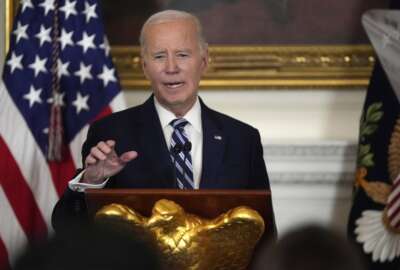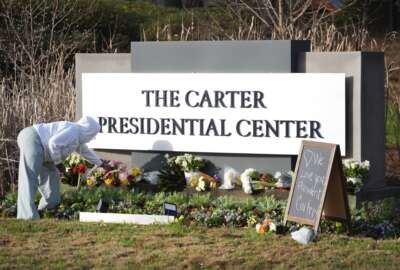In another jab at Cooper, N Carolina lawmakers override veto
The North Carolina legislature seized the initiative in a monthslong effort to weaken Democratic Gov. Roy Cooper, overriding his veto of a Republican bill that...
RALEIGH, N.C. (AP) — The North Carolina legislature on Wednesday seized the initiative in a monthslong effort to weaken Democratic Gov. Roy Cooper, overriding his veto of a Republican bill that would reduce the number of judges on the state Court of Appeals.
Several hours apart, the GOP-dominated state House and Senate completed the override, marking the second time in a week that they succeeded in going over Cooper’s head to enact a law that takes power away from the state’s new chief executive.
The approved measure means the intermediate-level court would shrink from 15 judges to 12 through attrition. It would prevent Cooper from filling seats being vacated by the next three retiring judges.
Republicans haven’t stopped trying to reduce Cooper’s powers since he became governor four months ago — they actually started doing it before he got sworn in. And Cooper hasn’t stopped fighting back. But with Republicans holding veto-proof majorities in both the House and Senate, Cooper is powerless to stop these and other bills also moving through the pipeline — as long as the GOP stays united.
So he’s sued instead and blasted them publicly.
“Instead of partisan power grabs, the legislature should be focused on creating good jobs, improving our schools and helping communities rebuild from Hurricane Matthew,” Cooper wrote this month in an online post. The October storm caused billions of dollars in damages to eastern North Carolina.
Cooper last Friday vetoed the Court of Appeals measure, as well as one that merges the state elections and ethics boards and divides the board equally between Democrats and Republicans. The legislature overrode the veto on the elections board bill Tuesday.
Cooper sued successfully last month to overturn a very similar election board law that GOP legislators approved two weeks before he took office. He went to court again Wednesday, saying the updated elections and ethics measure is no better than the first one struck down by a three-judge panel and needs to be blocked before it takes effect early next week.
The latest elections measure is also unconstitutional, Cooper’s lawyer wrote, in part because the board will be prone to deadlock on elections, ethics and campaign finance matters because of the even number of board members.
The new law is “designed to neuter the state’s elections oversight capabilities and prevent the governor and the executive branch from faithfully executing the state’s elections laws,” Cooper attorney Jim Phillips wrote.
But the GOP says Cooper just wants to tip the appeals courts in favor of the state Democratic Party because he could fill GOP vacancies with Democrats. And without the new election board law, the majority of election board positions would continue to remain with the party of the sitting governor, as state law has directed for more than a century.
Cooper “wants to rig the system for his own benefit,” House Speaker Tim Moore and Senate leader Phil Berger said in a release after Cooper vetoed the two bills. The two leaders beat Cooper to the courthouse on the new law, filing documents Tuesday asking that judges find the new election and ethics board law satisfies their concerns and is constitutional.
The fighting has deteriorated relations between the executive and legislative branches already frayed this year as they hammered out a compromise to eliminate the state’s “bathroom bill,” also known as House Bill 2. The recent litigation already has a calculable monetary cost in taxpayer dollars: more than $760,000 in expenses on private lawyers hired by Cooper and legislative leaders fighting over the challenged laws so far this year, according to documents.
Cooper defeated GOP Gov. Pat McCrory in November by just 10,000 votes. Lawmakers began chipping away at his powers the week after McCrory finally conceded the race in early December.
A former attorney general, Cooper isn’t afraid of going to court. He filled his first lawsuit to challenge the laws two days before he was sworn in as governor.
One law he challenged — the right for the Senate to confirm his Cabinet picks — was upheld by a three-judge panel. Cooper has appealed.
Republican leaders say they are not targeting Cooper personally. They simply want to readjust how power is shared in the aftermath of a state Supreme Court decision in 2016 that favored gubernatorial authority.
The ruling “fundamentally changed the way government operates in North Carolina,” Rep. David Lewis of Harnett County said Wednesday. “The legislature is responding by reasserting duties and responsibilities to itself.”
Democrats say the measures are thinly veiled efforts to weaken Cooper and control the state’s judiciary. Wednesday’s bill up for the override vote hasn’t been requested by the court or any judicial group.
“It’s certainly not necessary. You have to ask yourself, ‘Why the change?'” House Minority Leader Darren Jackson of Raleigh said.
Another bill given House approval Wednesday would prevent Cooper from filling several kinds of judicial and local prosecutorial vacancies with his own picks. Instead, he would be limited to choosing from a list of candidates provided by the party of the judge or the district attorney that has left office.
Copyright © 2025 Federal News Network. All rights reserved. This website is not intended for users located within the European Economic Area.





